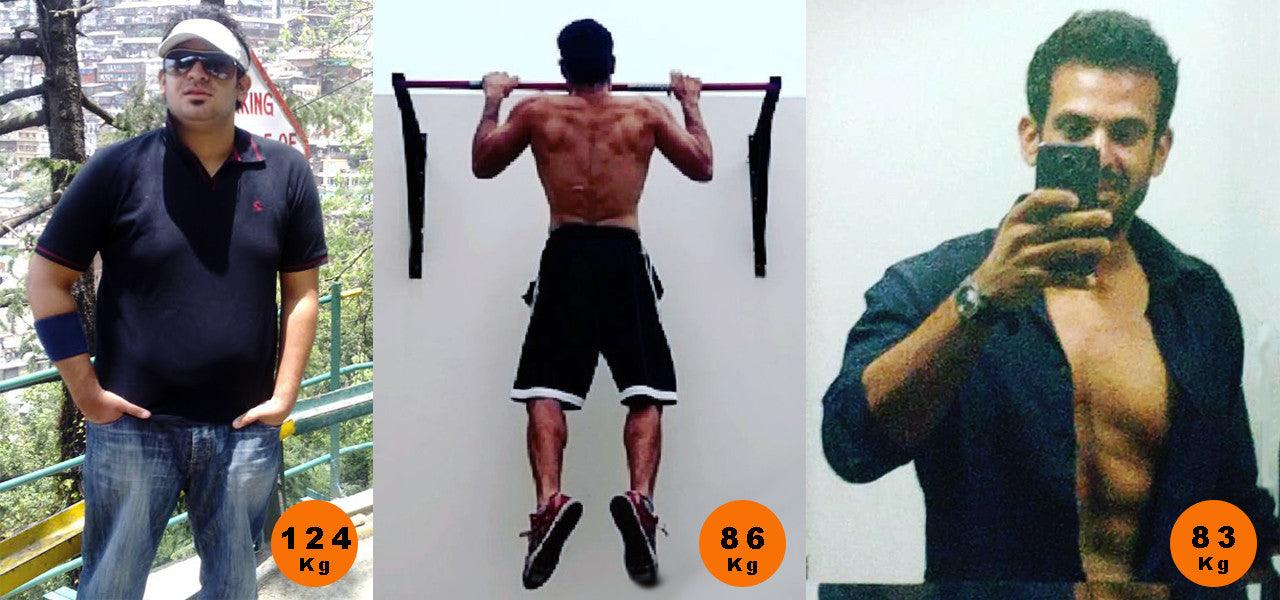
My 90 Pounds Weight Loss Journey.
Can a food-loving guy lose weight? "Yes!", according to Ankit Grover, you can lose weight to the tune of over 90 pounds. When he started with his fitness journey, he wasn't even sure about the results. It was for the love of butter chicken, that he even started his fitness journey. He was always interested in sports but couldn't do well because of his fitness levels.
"I was always fond of playing sports but couldn't excel in any, back in my school days i was awarded with a title 'Jack of all Trades, Master of None'. It's always a bad feeling when someone calls you 'mota' (Fatty) or 'Baby Elephant'. When I recall carrying that burden for 22 years, it is still the single-most motivating factor in my life.
My opinion for getting lean muscle is to just focus on your diet. Nothing is more important than your diet. I do functional training with intermittent fasting. To know how to get there, continue reading this article.
Training
I usually do strength training 4 days a week and rest 3 days, I exercise, but focus more on skills and mobility.
My Strength training includes Deadlift, Bench-press, Squats and Oly-Lifting.

Intermittent Fasting With Carb cycling by Lean Gains
I have followed a 16:8 plan where 16 hours in a day is the fasting time and 8 hours window you have to eat. I have followed 'Martin Berkhen' & Andrew John Morgan diet plan.
I started with carb cycling where my intake was a combination of carbs & protein on my training days - which was usually 4 days a week. For the rest of the 3 days, my focus was on consuming more fat and protein.
Count your macros:
It is the most important thing to look after. You should know what you are eating and what is good for you.
On my training days:
Training Day Food - 4 days a week. High Carb, Low fat.Protein: Body weight in poundsCarbs: 1.5 times the body weight in poundsFat :1/3 the body weight in poundsNon-Training Day Food - 4 Days a week. Low Carb, High(er) fat.
Fasted training
Training is initiated on an empty stomach and after ingestion of 10g BCAA or similar amino acid mixture. This "pre-workout" meal is not counted towards the feeding phase. Technically, training is not done on an empty stomach - as that would be detrimental. The pre-workout protein intake (BCAA), with its stimulatory effect on protein synthesis and metabolism, is a crucial to optimize results. The 8-hour feeding phase starts with the post-workout meal.

Fast - Sample meal plan
11.30-12 AM or 5-15 minutes pre-workout: 10g BCAA
12-1 PM: Training (mostly strength training)
1 PM: Post-workout meal (largest meal of the day)
4 PM: Second meal
9 PM: Last meal before the fast
Calories and carbs are tapered down throughout the day in the example above.
Key points
* No calories are to be ingested during the fasted phase (though coffee, calorie free sweeteners, diet soda and sugar free gum are allowed). A tiny splash of milk in your coffee won’t affect anything either (½-1 teaspoon of milk per cup at the most - use sparingly and sensibly if you drink a lot of coffee). Use sugar free gum in moderation (~20 g).
* The fast is the perfect time to be productive and get things done. Don’t sit around, get bored and brood about food.
* Meal frequency during the feeding phase is irrelevant. However, most people prefer three meals.
* The majority of your daily calorie intake is consumed in the post-workout period. Depending on setup, this means that approximately 95-99% (fasted training), 80% (one pre-workout meal) or 60% (two pre-workout meals) of your daily calorie intake is consumed after training.
* The feeding window should be kept somewhat constant as we tend to get hungry when we're used to eating and maintaining a regular pattern. This makes diet adherence easier. If you're used to breaking the fast at 12-2 PM and ending it at 8-10 PM, then try to maintain that pattern every day.
* On rest days, meal one should ideally be the largest meal, as opposed to training days where the post-workout meal is the largest meal. A good rule of thumb is to make meal one on rest days at least 35-40% of your daily calorie intake. This meal should be very high in protein; as an example, some people consume more than 100 g of protein in this meal.
* Macronutrients and calorie intakes are always cycled through the week. The specifics depends on personal ultimate goal: fat loss, muscle gain or body recomposition. . Generally speaking, carbs and total calorie intake is highest on training days. On rest days, carbs are lower and fat is higher. Protein is kept high on all days.
* For fasted training, BCAA or an essential amino acid mixture is highly recommended. However, if this feels like too much micromanaging or simply questionable from an economic standpoint, you could also make due with some whey protein.

1 comment
Thank you very much for sharing this great information about bcaas and other supplements. I was actually looking for natural foods with bcaa and other essential nutrients that I need so that I don’t need to take artificial supplements. This article helped a lot.